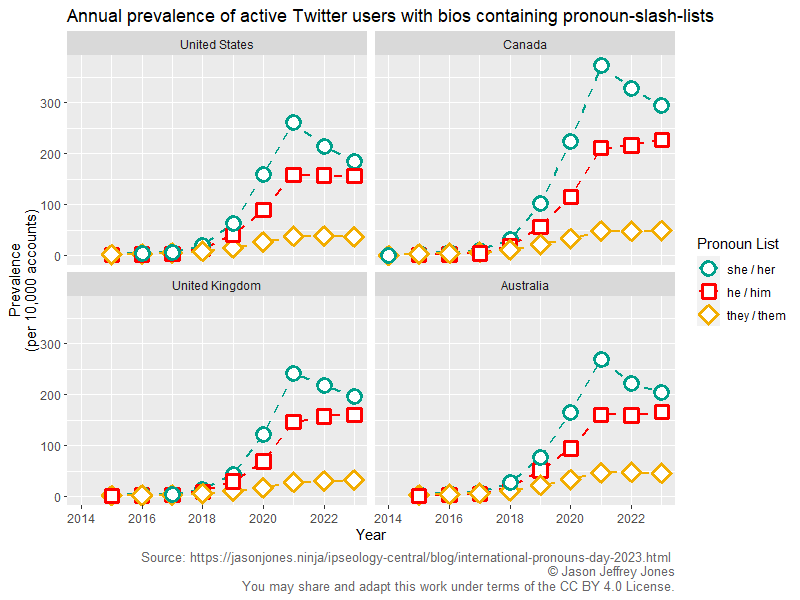Ipseology
using large datasets
and computational methods
Multinational Ipseological Analysis for 2023 International Pronouns Day
Estimating preferred pronoun prevalence in annual Twitter bio samples in the US, Canada, UK and Australia
2023-10-18
Previously, I provided evidence that the inclusion of pronoun lists within Twitter bios was a fast-growing trend in the United States. Are individuals in the United States unique in this behavior? Let's find out.
For International Pronouns Day this year, I will use a multinational database I am developing with my collaborators. The currently complete portion estimates the prevalence of all words and phrases within users' bios separately for several nations. Here is a quick description of the methods:
- From 2012 through 2023, I compiled an archive of the 1% random sample of tweets.
- Each tweet had a snapshot of the author's profile attached. I selected (randomly) one snapshot per user, per year.
- Each user was assigned a nation based on the text they provided as a location in their profile.
- I tokenized (split) each bio into words and counted the number of unique users that included each word (and phrases up to five words long) in their bio.
- Below I plot series for
she/her,he/him, andthey/them.
- Below I plot series for
- From the count, I computed the prevalence per 10,000 within the sample.
- A prevalence of 20 means that within a set of 10,000 users, one would find 20 including the word or phrase.
We will provide a more detailed methods description in a manuscript we aim to complete and post in January 2024. At the same time, we plan to make available a multinational database of ngram prevalence similar to the US data in Jason Jeffrey Jones Identity Trends.
Now, how about some results?

These other nations present similar trends as the United States
The trends are strikingly similar across these Western, predominantly English-speaking nations. In every nation, she/her came to be included more than he/him. Prevalence of they/them reached about 50 per 10,000. Before 2015, prevalence did not meet the 1 per 10,000 threshold for any pronoun list in any nation.
She / her was more prevalent than other pronoun lists, but its primacy is fading
The prevalence of she/her accounts appears to have peaked in 2021. Recall that these samples are cross-sectional, and the user must have posted a tweet in that year to be eligible for sampling. Further, the more often a user tweeted, the more chances they had to be sampled. (Users are only counted once per year, no matter what, however.) So, one should not conclude that individuals are deleting she/her from their bios. That is one possibility, but other causes for this pattern could be (1) she/her accounts authoring fewer tweets after 2021 and (2) accounts without she/her in the bio authoring more tweets after 2021. (If she/her individuals deleted their profiles or abandoned Twitter at higher rates than others, I would subsume that under possibility (1).)
Concerning X, Elon Musk, etc.
Note that my data ends on June 9, 2023. That is when my API keys that allowed sampling the 1% stream stopped working. No data follows the official rebrand to X which occurred in July 2023. The 2022 data contains user activity spanning the whole sequence of the acquisition: pre-Musk, Musk offers to buy Twitter, Musk attempts to not buy Twitter, Musk is forced to/agrees to buy Twitter. Twitter officially changed ownership on October 27, 2022.
Studying Twitter users' inclusion of pronoun lists in their bios is a thing?
Yep. I linked my open-access, peer-reviewed articles in the first paragraph. Let me take this space to recommend others. In Profile Update: The Effects of Identity Disclosure on Network Connections and Language, Minje Choi and colleagues contrasted user behavior pre- and post-inclusion of pronoun lists. Michele Marie Aponte Molina's master's thesis explored self-presentation of gender identity and gender expression in Twitter bios. Within a large corpus of English-language tweets, Julia Jiang and colleagues found the same temporal trend of increasing pronoun list inclusion within Twitter bios.
Ipseology - Read and explore more
- Quickly get familiar with ipseology terminology: Ipseology Glossary
- Read a free, online introductory book on isepology
- Download a peer-reviewed, open-access research article about political words: Using Twitter Bios to Measure Changes in Self-Identity: Are Americans Defining Themselves More Politically Over Time?
- Search for trends in annual, cross-sectional United States samples: Jason Jeffrey Jones Identity Trends V2